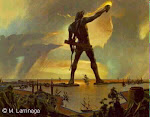Today I was observed in class for perhaps the 6th time this year, the third time by my Masters Program observer. Looking back to the first time I was observed, I must say, I was going into it with no small degree of trepidation. I had lain in bed the night before wondering what the next day would bring. I frequently reflect on what I do -- and what I fail to do -- so that I can spot my mistakes. And goodness knows I'm making them. I spot them constantly. And lest, gentle reader, you think me overly scrupulous, I am, after all, a novice. However much "presence" or "poise" or natural instinct I may have, I have made mistakes on a nearly daily basis since the beginning of the year. They are certainly little ones, but I had always assumed that if a neutral & objective outsider were to enter my class, I would get called on the carpet for them.
"Like what?" you may ask? Well, I sometimes speak with my back to the class at the chalkboard. Never for longer than a few words, but anybody with any knowledge of education (or theater, and trust me, there's little difference) knows you don't turn your back. I have tried to compensate by keeping the students on their toes, the seating positions in the room, and so forth, but I'm supposed to always be watching. And I am sometimes not.
Then there are the times when I overreact. A student gets out of their seat for the 800th time without permission. And it was just to go to the trash can. And I kick them out. What did they do? Was that the best way to handle it? And me losing my temper, well, I don't blow my top over just any little thing. But I have. And I do. The virtue "temperance", meaning to moderate our activities and emotions, gives us the phrase, "to lose one's temper." For if you lose it, you lose your rational control over your emotions. Indeed, one could become inconsolably sad and be said to have lost one's "temper," though it is hardly if ever used in that context in English. I have seen it in myself and I have tried to work on it. But that doesn't mean it doesn't happen.
Lest I make this my public confessional - my Confessor gets that enough already - I digress. My observations have instead tended to focus on the "big things" about me, rather than the "little things" already mentioned. They remark on my professional style of dress, of speech, etc. They mention my organization and preparation skills. They comment on how much the students respond to me, how they obey me, how they laugh with me, how they respond eagerly to my questions. They comment on how clean my room is. They point out how wise I am to begin my class with a quote and how much that must assuredly encourage the critical thinking I so hope to engender in my students. They tell me I'm aware of everything that is going on in my classroom. They give me applause and comments such as, "You would never know it's his first year."
They give me the big picture.
And, without realizing it, they give me an important criticism that I had not before today really noticed. I focus so much on details. It's my nature. In a very real sense, it's my job. It's what I received my first M.A. in (International Relations) since the social sciences are so dependent on details to make valid points. I have an undergrad minor in Economics. I am OBSESSED with the pieces that make up the puzzle almost to the point that I forget the big picture that I'm supposed to have when it's all said and done. (And before you think I'm better at Micro, I prefer MacroEconomics... but my micro-management style bleeds into my studies there, too)
I get upset that I lose my temper with a student (as well I should), but the other students who witness it are now more likely to tote the line. I obsess over the fact that my back is to my class, but my students are learning the material. My kids have terrible reading comprehension, but it's tenfold better in some cases than it was when they first met me. They're learning to think, to write, to speak, and I'm upset that they haven't mastered the English language? My mother used to tell me on a daily basis, "Don't sweat the small stuff." I do anyway. But I'm quickly figuring out that sweating small stuff only uses up the energy that could be spent on big stuff.
I am, by profession, a Watcher. I watch the time. I watch students. I watch TV. I watch (read) books. I plan so that I can watch some more. I watch others for signs of growth, for signs of deviousness, for signs of gum chewing, for signs of sincerity... I watch for triumph so I can praise it. And I watch for failure so that I can correct it. And I watch myself with the same "watchful" eye.
It's good to know that when I'm being watched, the person(s) doing the watching likes what they're watching. And not only that, they're watching what really matters about me. My students should be so lucky to have me watching them with the same macro-vision eye. If others can see that big picture in me, well, that might be a lesson to me that even the "Watcher" still has some things, some good things, to watch for -- not just in himself, but in his students as well.
Tuesday, November 20, 2007
Subscribe to:
Post Comments (Atom)

No comments:
Post a Comment